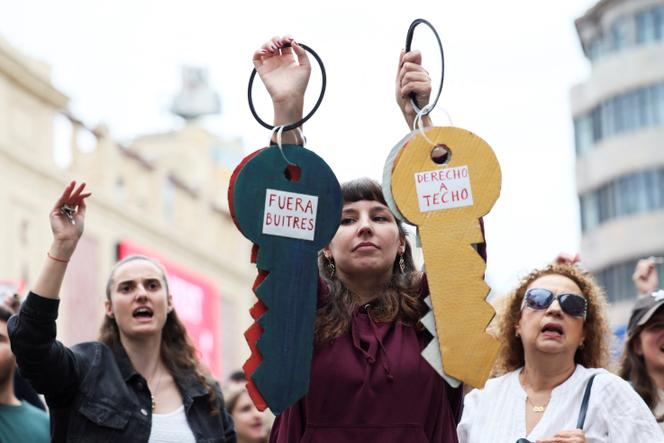


On Sunday, October 13, tens of thousands of people marched through the streets of Madrid to demand a solution to the housing crisis. They jingled their apartment keys menacingly and brandished placards against rentiers and speculators. In the Spanish capital, rental prices have risen by an average of almost 30% over the last five years. According to property portal Fotocasa, tenants spend an average of almost 60% of their income on rent only. Social housing stock represents just 2.5% of the total.
In the streets, anger is rising. "We need a rent strike!" chanted the members of the Tenants' Union in their orange T-shirts, as they were approaching Madrid-Atocha train station. The city's main station was the starting point for the demonstration called by some 40 associations and social and trade union organizations. Among them was the Stop Desahucio ("stop eviction") association, whose members, dressed in green, unfurled a large banner reading: "The rentiers are stealing our lives. Governments defend rentiers."
Among the protesters, a majority of young people expressed their anger. "I earn €1,800 a month as a saleswoman in a luxury jewelry store, and pay €750 to live in a 20-square-meter attic studio, where my fiancé can't even come to see me because he can't stand up... And even then, it's supposedly a bargain," said 31-year-old Faustine. "I'm an architect. I make houses, but I can't afford one," read the sign held by a young man nearby. "We're being robbed of our future," the demonstrators shouted. In Spain, 66% of young people aged 18 to 34 still live with their parents.
Faced with rising rental prices, Pedro Sanchez's Socialist government approved a new housing law in May 2023 to control prices. Based on a price index drawn up by the Ministry of Housing, the law allows autonomous regions to cap rental prices in municipalities where the rental market is classified as "under stress." However, there is no obligation for regional governments to apply it, so the measure has only been adopted by Catalonia, and with mixed results.
Since the regulation came into force in March, rental prices have fallen by an average of almost 5% in the 140 Catalan municipalities where it has been applied. However, over the same period, the number of long-term rental contracts has fallen by 17%, according to the Catalan government. The Tenants' Union has welcomed the drop in prices and considers that the fall in the number of contracts is partly due to their greater stability, as they have been extended from five to seven years. However, the Union has also warned that part of the rental supply is being fragmented into single-room rentals or diverted towards so-called "temporary" accommodation – which lasts less than 12 months and is not subject to price controls. These strategies allow rentiers to elude the new law.
You have 15.09% of this article left to read. The rest is for subscribers only.
